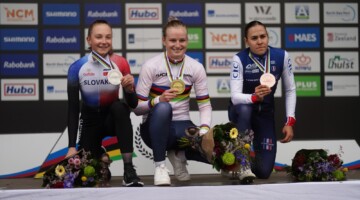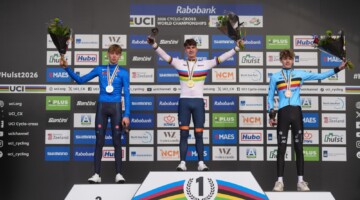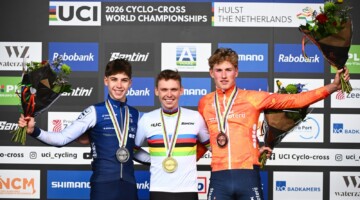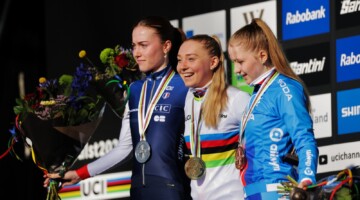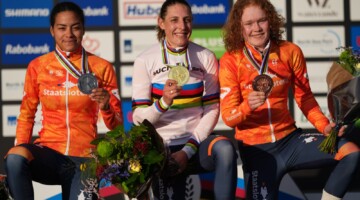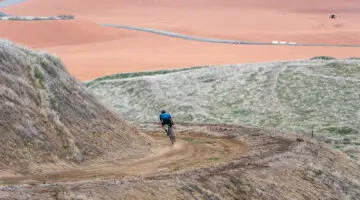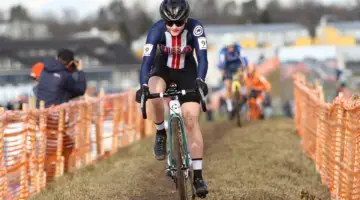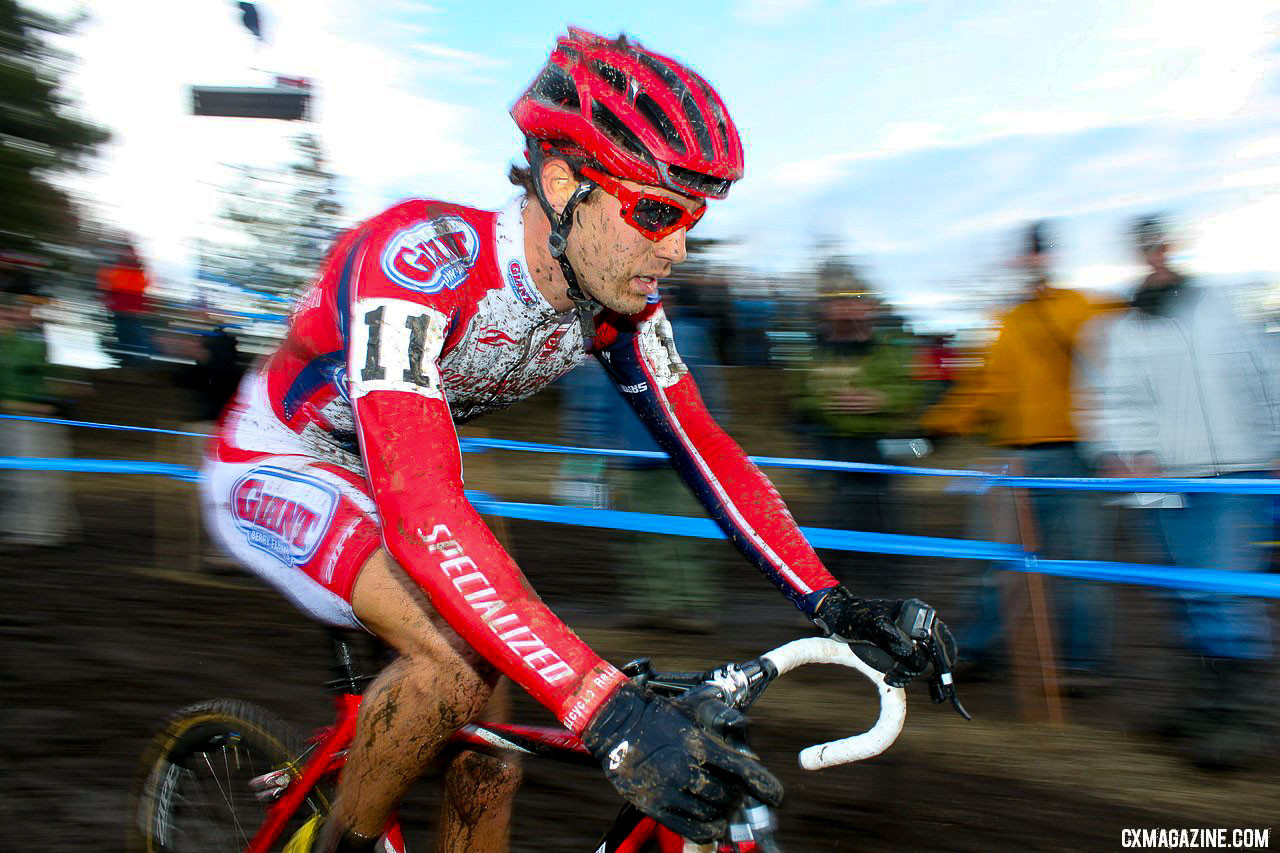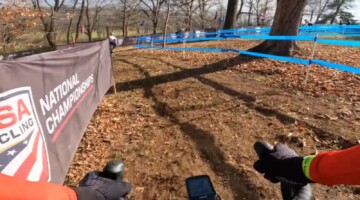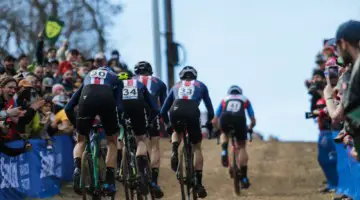During Nationals while we were heads down in race coverage, USA Cycling announced the hiring of Jesse Anthony as the governing body’s Cyclocross Manager.
Anthony is the governing body’s first full-time cyclocross-specific staff member and fills the position that Adam Myerson said the Cyclocross Committee pushed for.
In Louisville, we chatted briefly with Anthony, a former Cyclocross Magazine columnist and perpetual Junior and U23 National Champ in cyclocross, about his new role and made a date to chat after the Louisville mud settled.
Just before Christmas, CXM’s Andrew Yee connected with Anthony to learn more about his return to cyclocross after retiring in 2011, his vision for the sport, and what he has on his already-full plate. See the interview below to get inside the mind of USA Cycling’s new chief of cyclocross.
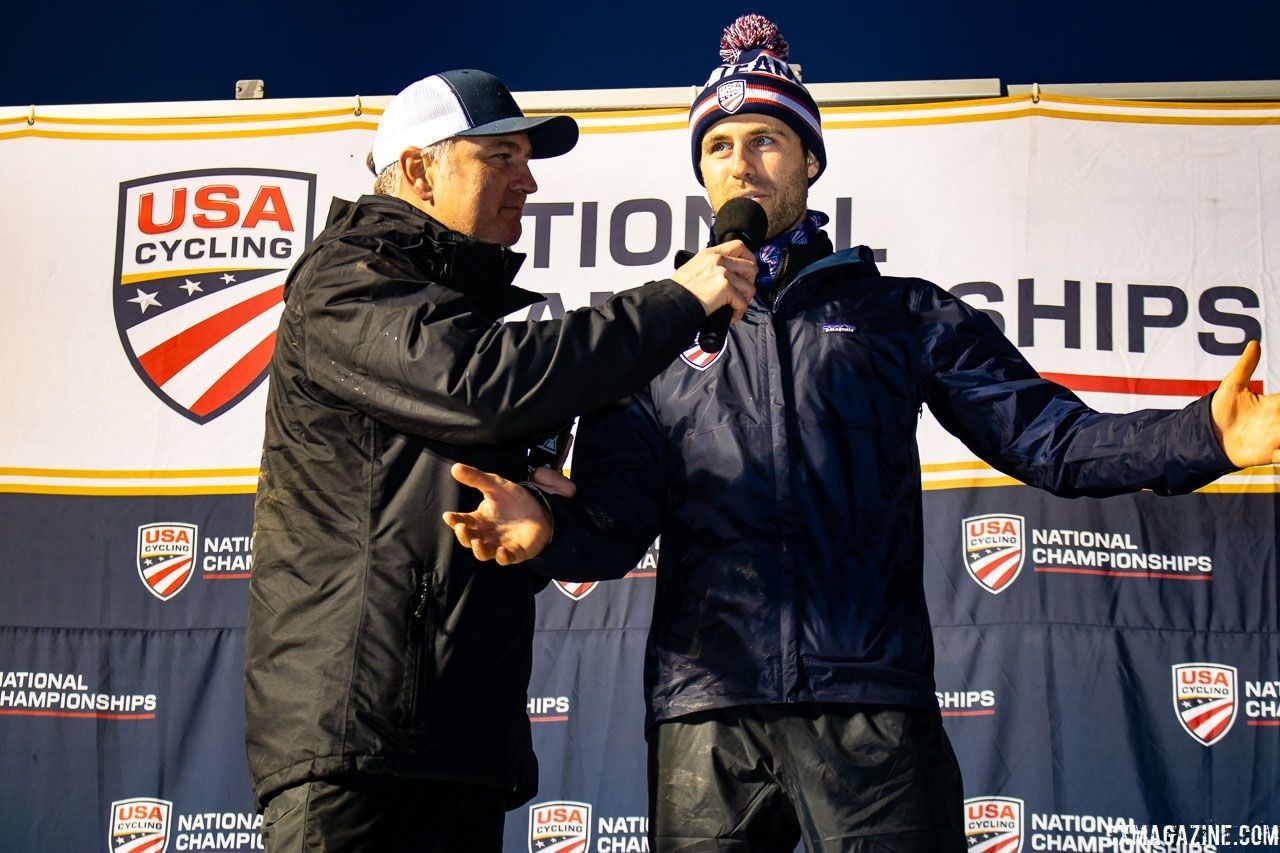
Jesse Anthony was introduced as the new Cyclocross Manager at the 2018 Cyclocross National Championships V2. Louisville, KY. © Cyclocross Magazine
Disclosure: Although it is not Cyclocross Magazine’s policy to have interviewees edit transcripts and responses, Anthony requested an opportunity to see and edit his responses before they were published. The following answers are predominantly from our phone conversation but include Anthony’s typed edits.
Interview: Jesse Anthony, USA Cycling Cyclocross Manager
CXM: Congrats on the new role. How has it been for the few weeks you’ve been in it?
Jesse Anthony: Thanks. So far, it’s been a whirlwind. It’s really cool to get integrated at USA Cycling and meet the team of people I’ll be working there with. Obviously, I jumped right into ’Cross Nationals directly after I was hired, so that was cool. It was super awesome to be back at Nationals and see all my friends from the ’cross community.
CXM: Awesome. I saw your announcement when you were retiring from pro road racing, but is this the type of post-racing career you envisioned?
JA: Good question. I have to admit, for most of my career and the last several years when I had been considering retiring, this is not the type of position or job I was expecting to do.
CXM: What did you have in mind? What did you envision?
JA: That’s a good question. Every few years, what I thought I wanted to do would change. The most recent idea I had the last couple of years was to work in the coffee business.
CXM: Wow.
JA: Yeah. I really like coffee and I think it’s a cool business. There are a lot of opportunities to do different stuff in coffee. I was kinda thinking I’d jump in there somewhere.
But when I was truly done racing, when I got diagnosed with Epstein-Barr this year and I decided to retire, it was kinda odd to me how it happened, but I just kind of naturally felt like I wanted to stay working in the sport. I felt like I have so much experience, having been racing in the sport for about 20 years, and I really want to share it.
Obviously, I was racing at the professional level for a long time. I was involved in things like the Pro Committee at USA Cycling. Ever since I began serving in that Committee in 2011, I had that in the back of my mind that it would be cool to work at USA Cycling because they were truly guiding the sport in America, and there was so much room for growth there.
Especially under Derek Bouchard Hall’s leadership, I saw a lot of things were changing there for the good, and the organization was going in a really good direction. They were hiring some different people and restructuring the system internally. I saw that a little bit from the outside, being on that Committee, and that’s what first sparked any interest in me working at USA Cycling.
CXM: Got it. So what’s the job description of this role?
JA: That’s a great question. My job description is kind of broad. Some of the main things are that I’m here to communicate with and support the cyclocross community. I’m kind of a point of contact for all things ’cross in America with regards to USA Cycling. Part of my job will be to bolster the development process and work on some Junior and Under 23 development programs. My main purpose here is to support the sport in every facet from grassroots racing all the way to Elite athletics.
CXM: Got it. How would you measure your success? Are there stated metrics out there that you’re trying to move, or are they still TBD?
JA: That’s a great question. I think that’s still to be determined.
CXM: The Anthony family, and you in particular, you’re cyclocross royalty. You’ve won countless national titles when you were young. It’s been a little bit since you’ve been racing ’cross, right?
JA: Yeah.
CXM: We also know there were a few other well-qualified candidates out there for the position. Just curious what you think set you apart.
JA: I feel like I was well-qualified for this role given my background in the sport. Coming up through the sport of cyclocross under the USA Cycling development process and racing at a high level from a young age, I directly experienced what the development process is like. Obviously, I went over primarily to road cycling for a while, but I’ve stayed involved in the cyclocross community and I have a lot of friends and a lot of experience here.
Some of my qualifications are that I am a good communicator, which is going to be a big part of this job. Those are a couple of the things that I knew were strengths of mine. I don’t know what the other people’s strengths were or where I may be better suited, but I know that there are many people around the country with a lot to add to this sport, and I look forward to integrating as many people as possible into the USA Cycling network.
CXM: Makes sense. When you stepped away from ’cross though, how much did you follow the racing? Did you follow European racing as well?
JA: I followed a lot of the domestic racing, mostly because a lot of my friends and my family were still racing. My sister, Crystal has still been racing at the Elite level for a long time and I was even coaching her for a few years.
CXM: Oh, wow, I didn’t realize that.
JA: Yeah, I coached her for a few years, and then I was closely following her results and her career. Even though I did race road professionally for the last eight years after I stopped racing ’cross at the Elite level, I was still a big fan of the sport. I’ve always been a dirt rider at heart. I’ve always been a ’cross guy.
I quit the sport more for physical reasons than anything else. I was having a lot of back issues, and injuries that were really hard to manage in the ’cross races, that were a little easier to manage racing road bikes. And that was the main reason that I quit racing ’cross full time in 2010. It wasn’t that I had any distaste for the sport, I’ve always appreciated the sport. I’ve definitely continued to watch it, especially the domestic level. The international level, I haven’t watched it super closely the last six or seven years.
CXM: Well, I can give you a quick update on the men’s side. Mathieu van der Poel is pretty good.
JA: [Laughs] There are the easy ones and then as you go deeper in the fields obviously, yeah, they’re not quite as visible. This year, I’ve been paying a little more attention knowing that I was applying for this job, so I did start to watch the results a little more closely.
CXM: What’s your take on the state of the sport right now?
JA: That’s a good question. I went to Nationals this year and I was super stoked about the energy there. It was awesome. There were so many people. The energy was amazing! There’s a lot of impetus behind the sport, there’s a lot of people participating. All the categories had tons of racers in them. So many young people out there, and I think there are a lot more young riders in the country that we can get into cyclocross, so I see a big opportunity there. It is good to see the health and the numbers in those younger categories.
So yeah, being at Nationals was awesome. It was great to see how many people were involved, the fan base, the participants, everything. And then from looking at the calendar and watching the sport a little bit from the outside the last few years, one of the biggest differences I see now from when I was racing is that the hotbeds, New England, the Pacific Northwest, and Colorado are being matched by other parts of the country.
Now there’s good racing all around the U.S. Really, really good mid-Atlantic scene, and given there’s been good mid-Atlantic racing for a long time, but even in North and South Carolina. Oklahoma has a UCI race. There are a lot of good events in the Midwest, and of course Louisville’s been a part of it for a while. California has UCI events. The sport has really spread out across the country in a way more consistent way than when I was racing.
I see that as a big opportunity to continue the growth of the sport. I think the sport has been growing for a long time now—and it’s continuing to grow—and I see a big opportunity to create some focus on the sport within the nation.
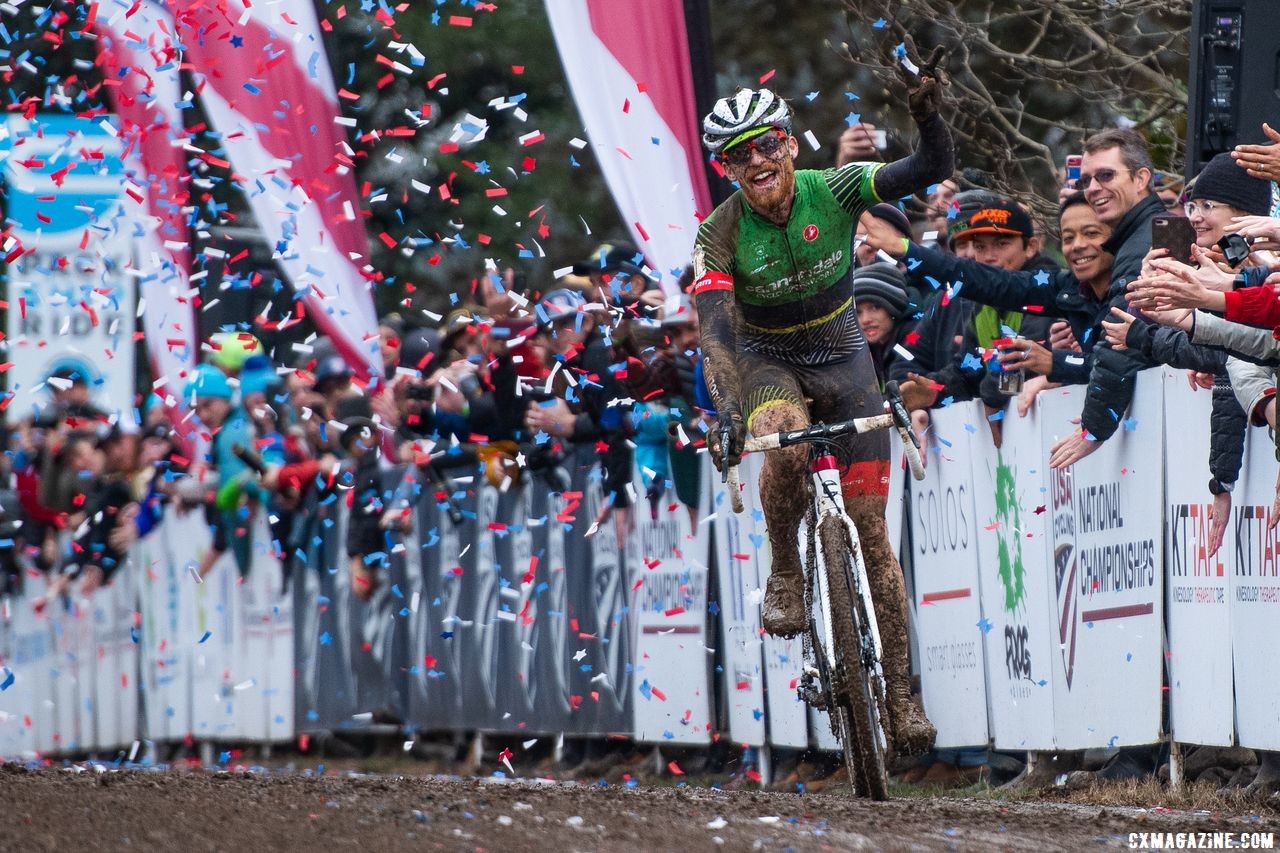
Louisville Nationals brought out riders and fans alike. Joe Creason Park, Louisville, KY. © D. Smaic / Cyclocross Magazine
CXM: When we last talked with Adam Myerson, he’s on the USA Cycling Cyclocross Committee, he indicated that bike racing in general, and cyclocross specifically, have had recent declines. It wasn’t clear whether that was in both unique racer numbers or racer days, but he also said that USA Cycling doesn’t have a recruitment program to get new people into bike racing.
To an outsider, that seems a little shocking. I know it’s only been a couple weeks, but, curious what ideas you have to help grow cyclocross specifically, and bike racing in general.
JA: Yeah, that’s a really good question. I think these are some of the things that I’m asking questions about. I think I have a lot to learn in that regard, as to how to really draw people into the sport. But I think one of the things that we have going for us as cyclocross fans and people in the sport of cyclocross is cyclocross is probably the easiest discipline to get into.
CXM: Yeah. That’s the beauty of it.
JA: The bikes are not super expensive. There is a lot of good grassroots racing around the country. You can go to a park or any small area and do it. It’s versatile, it brings people together from both mountain bikes or road bikes.
CXM: Right.
JA: As far as getting people into the sport, I think cyclocross is a great way to introduce people in the sport and say, “Hey, why don’t you try competitive cycling? Why don’t you try this type of racing?” It’s super exciting, it’s action-packed, it takes technical skill, it takes strength, it takes speed, it takes some endurance. You can do a little shorter training. It’s not a long endurance event and it doesn’t take quite as much time as some of the other types of riding.
So, as far as reaching out to people, that’s a marketing question. We have a great sport for people to get into, and I think there’s a big opportunity to connect with riders from the NICA mountain bike leagues. We can approach young riders and say, “Hey, isn’t bike racing great? Why don’t you try this other discipline?”
That’s how I started. I was probably in middle school at the time, but my brother and I were riding mountain bikes and we started racing mountain bikes, and then the people in Essex County Velo and Stu at his shop were like, “Hey, why don’t you guys try cyclocross? It’s a really fun sport. We all do it.” We were like, “Okay. That sounds fun, we’ll try that.”
A lot of getting people into the sport is done by word of mouth. Building the communities and supporting the clubs to have a good club structure. They can foster the people in their communities to come try cyclocross. It’s important to get bike shops to have ’cross bikes in them and say, “Hey, here’s a flyer for the local ’cross race, and here’s a ’cross bike.” I’m going to work on supporting some of those efforts.
CXM: You touched on why you left cyclocross at the professional level, but I’m curious, if you were ever able to make a decent living racing just cyclocross, would you have focused on it instead of the road? Injuries aside?
JA: That’s a good question. It’s hard to say. I don’t know. I would like to have had that opportunity, yes, but I made that decision.
When I stopped racing at the Elite level, a lot of people assumed it was for financial reasons. And at the time it was a factor. It was easier to make money on the road bike than it was on the ’cross bike, but then at the same time, when I left the sport was right about the time that that was starting to change. Guys like Jeremy Powers and Tim Johnson and Ryan Trebon were racing more specific cyclocross schedules. They chose to race cyclocross primarily where they had been racing road or mountain bikes alongside it for years. I think they still did some of the crossover, but it was right after I left that people did start to choose one sport or the other.
In general, I’m really not a fan of “if” scenarios, for obvious reasons, but to humor you, yeah, it’s just too hard to say if I could have made a decent living primarily in cyclocross. I love the sport of cyclocross and I was successful there to an extent, but it’s hard to say if I was not getting much better because of the back issues I was having, or if I was just not getting better and the back injuries were separate. It’s impossible to know which was the cart and which was the horse there.
CXM: Fair enough.
JA: Knowing my talent and ability level as a young rider, and seeing what Jeremy Powers made of his career in this sport after we came up competing closely as Juniors and U23s, it’s possible to say, “Yeah, I could’ve made a good living there.” But I’m not Jeremy, and he pushed through his own set of difficulties and challenges to get to where he was. I decided to maybe go the easier road.
CXM: Could you tell us about your first cyclocross experience? How you got into it?
JA: Oh, man, that’s a great question. It’s a bit of a long story, so let’s see if I can get this all right. My older brother Josh and I did our first mountain bike race in 1997. I was 12 and he was 15. We met Tim Johnson there, who was 19, I believe, at the time. It was a local race in Topsfield, Massachusetts near where we lived. So we did this mountain bike race, we were like, “Ah, this is awesome. We wanna race bikes, this is so cool.” We met [Tim]. Of course, he was 19, he was a punk kid, but we thought he was awesome.
I think it was later that summer. My brother, Josh, started working for Stu Thorne at his bike shop, Bay Road Bikes. We didn’t know the connection between Stu and Tim. We didn’t know who Stu was. I don’t even know how Josh found that shop. There were several local shops, so somehow he found or picked that one to apply for a job there, and so he started working there. And then I started working there about six months later, and I was 13.
So we were working for Stu. Obviously Tim was good friends with Stu, and Stu was supporting him in his cyclocross career already. I remember reading in the newspaper in January of 1998, 20 years ago, and we read that Tim finished 10th at the World Championships. This was in our local newspaper. We still didn’t really know who Tim was, but we saw it, we were like, “That’s the guy we met at the mountain bike race! That’s him!” We were freaking out like, “That’s so cool.” And then Stu was like, “Oh yeah, of course I know this guy.”
That was how we got into cycling, and then of course, we’re working for Stu and he raced cyclocross. His wife Emily raced cyclocross. Tim raced cyclocross. The shop sponsored Essex County Velo, which is still the club that puts on the Gloucester Cross Race. So everyone in the club raced ’cross, and in [the fall of]1998, my brother and I both started racing cyclocross.
CXM: And was it love at first taste?
JA: Yeah, we loved it! I don’t think I did very well. I did the beginner men’s race. I don’t think we had any age categories for young Juniors back then. I was on a 32-pound steel mountain bike that I rode at the time. It was a struggle for me as a little 110-pound 13-year-old kid to lift that heavy bike over the barriers. I do remember that. But, we had a great time.
Josh, he raced a little more than I did that year. He got into it, and my parents and some of the guys in the club were taking him to the races. Then my dad started taking me to some races, later in the fall. And then Josh did the national championships in Fort Devens, Massachusetts that fall. I didn’t race Nationals that year. The first Nationals I did was in 1999.
CXM: In the Presidio.
JA: Yes.
CXM: Did you win that?
JA: I did, yes.
CXM: Wow. What a debut.
JA: Yeah, that was the 10-15 category. It was the first time they had a younger junior age category in a national championship. Up to then, it had just been 18 and under.
CXM: Obviously USA Cycling has a marketing department and budget, but will you have control over any of that spend to focus on your specific discipline?
JA: Cyclocross is an important discipline to USA Cycling because it is one of our fastest-growing disciplines, so we definitely see the value in focusing some marketing resources towards cyclocross. I think it did a really good job with the production of the National Championships this year. It spent a lot of money to try to make that event really, really strong, and it shows. And, I’m going to push for more marketing initiatives toward cyclocross this year.
CXM: I guess along those lines, how will you split your time? Between Elite talent development and grassroots growth. Do you have any idea yet?
JA: It’s just gonna be a seasonal thing. Right now, I jumped into the job and went straight to Nationals and just have been going full gas with the working on the Worlds team and logistics for the World Championships. In February, that’s all gonna die down. Those riders are all gonna be taking their offseasons. That’s when I’ll start working on the events side of things, the grassroots racing and the infrastructure in the sport. Figuring out how we can support the UCI promoters, the grassroots events, the clubs, everyone.
CXM: You brought up your brother and your sister. I can’t keep it all straight, though. How many siblings do you have?
JA: [There are] seven [of us].
CXM: Seven!
JA: Josh is my next older brother. Crystal is the oldest of all of us, so they’re the two older ones, and I’m third. And then I have a younger sister and three younger brothers.
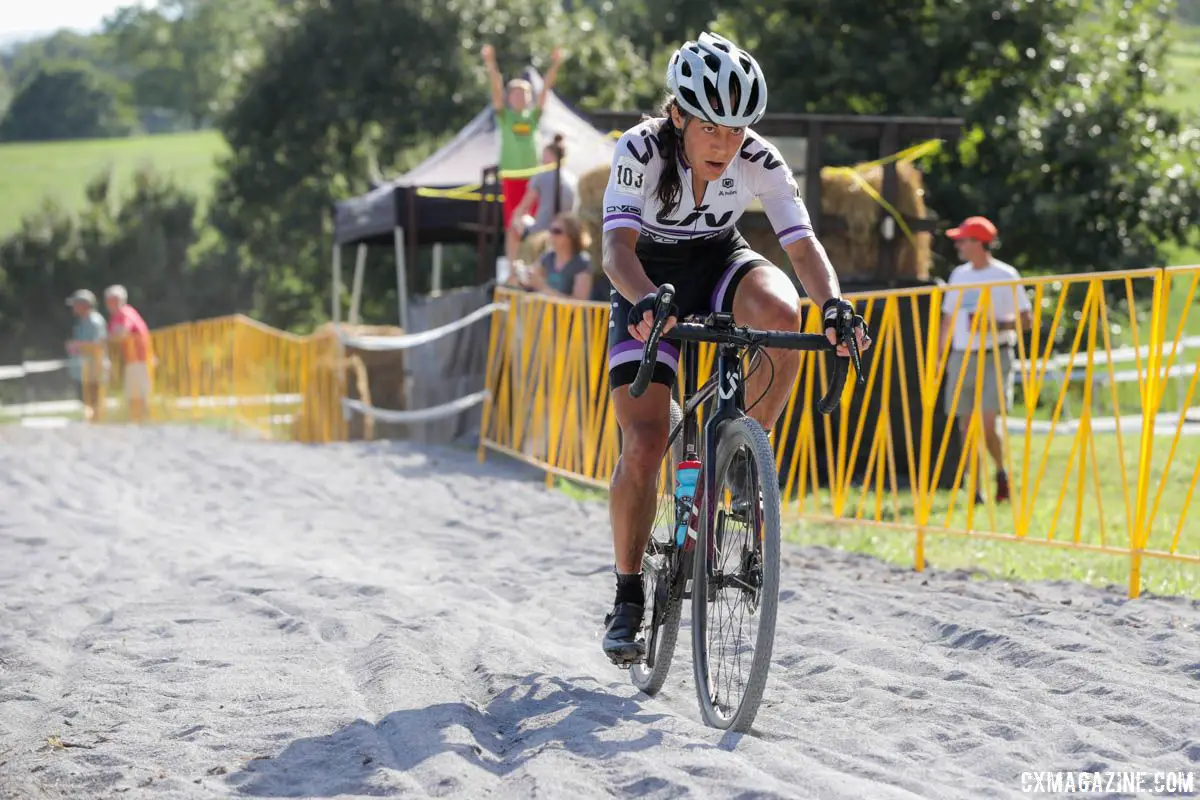
Crystal Anthony has been an Elite cyclocross racer for years now. 2018 GO Cross Day 2. © Bruce Buckley
CXM: Younger sister, three younger brothers. Do they all ride bikes, do they race ’cross?
JA: Yep, they all do. My younger sister and my second youngest brother don’t ride or race much at all. Silas, who’s my next younger brother is 28. He’s been racing either Cat 3s or Elite races in New England this year. And Josh has been back in those categories as well.
CXM: Oh, Josh is back racing? [Josh is a former Cyclocross National Champion as well.]
JA: Yeah. I think Josh actually might be a Cat 2, so he does a lot of the more local races, the regional races. He doesn’t really do the UCI stuff at all.
CXM: Cool. Thanks a lot Jesse. You’ve been generous with your time.
JA: Yeah, awesome. I appreciate you taking the time. I love your mission of promoting this sport!


